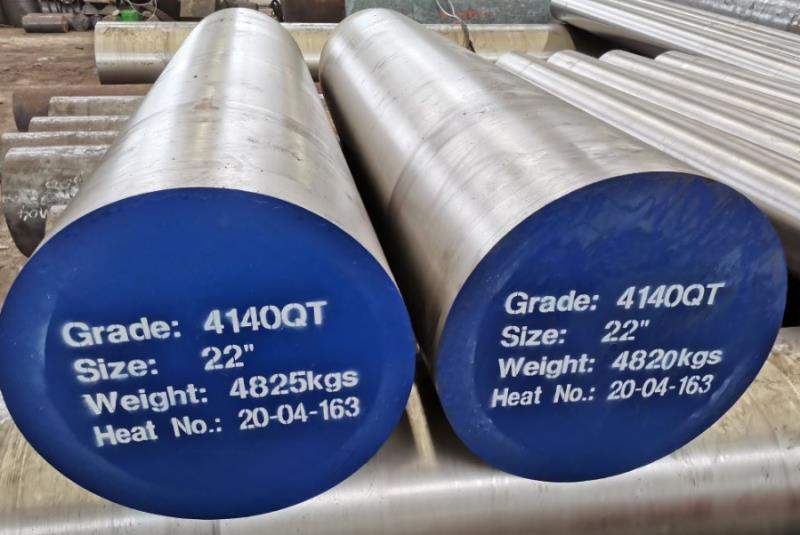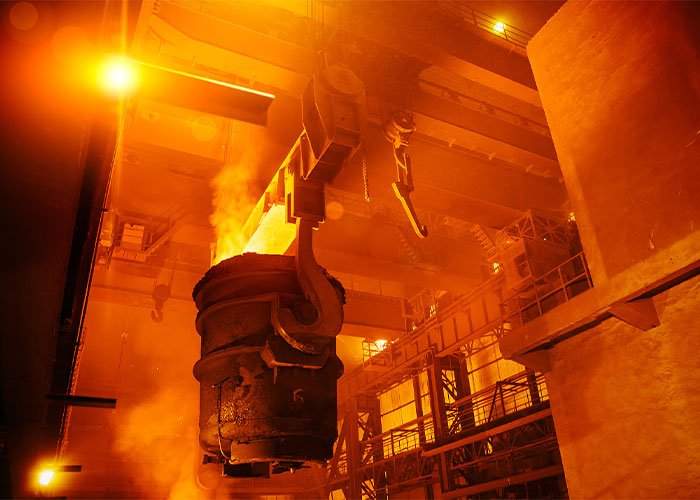Introduction
4140 steel is a popular alloy steel known for its excellent mechanical properties, versatility, and wide range of applications. The unique composition of 4140 steel gives it remarkable strength, toughness, and resistance to wear and fatigue. In this comprehensive guide, we will explore how the composition of 4140 steel affects its properties and performance. We will delve into the key elements that make up 4140 steel, compare it with other steels, and discuss its various applications. By understanding the impact of 4140 steel composition, you can make informed decisions about its use in your projects.
Understanding 4140 Steel Composition

Key Elements in 4140 Steel Composition
4140 steel is an alloy steel containing several key elements that contribute to its properties. The typical chemical composition of 4140 steel includes:
- Carbon (C): 0.38 – 0.43%
- Manganese (Mn): 0.75 – 1.00%
- Phosphorus (P): 0.035% max
- Sulfur (S): 0.040% max
- Silicon (Si): 0.15 – 0.35%
- Chromium (Cr): 0.80 – 1.10%
- Molybdenum (Mo): 0.15 – 0.25%
Role of Each Element
Carbon (C)
Carbon is a crucial element in steel that affects its hardness and strength. Higher carbon content increases hardness but can reduce ductility. In 4140 steel, carbon provides the necessary hardness and strength while maintaining good machinability.
Manganese (Mn)
Manganese improves the hardenability of steel and enhances its strength and toughness. It also helps in deoxidizing the steel during manufacturing, reducing the risk of defects.
Phosphorus (P) and Sulfur (S)
Phosphorus and sulfur are impurities in steel. While phosphorus can improve strength, it can also make the steel brittle. Sulfur enhances machinability but can reduce toughness. The content of these elements is kept low to maintain the desired properties of 4140 steel.
Silicon (Si)
Silicon acts as a deoxidizer in steel production and contributes to strength and hardness. It also improves magnetic properties and resistance to oxidation.
Chromium (Cr)
Chromium increases hardness, tensile strength, and corrosion resistance. It also enhances wear resistance and hardenability, making 4140 steel suitable for high-stress applications.
Molybdenum (Mo)
Molybdenum improves hardenability, strength, and toughness. It also enhances resistance to wear and high-temperature strength, making 4140 steel suitable for demanding environments.
Effects of 4140 Steel Composition on Its Properties
Mechanical Properties
Strength and Hardness
The carbon content in 4140 steel provides excellent strength and hardness. The addition of chromium and molybdenum further enhances these properties, making 4140 steel ideal for applications requiring high strength and wear resistance.
Toughness and Ductility
4140 steel’s composition ensures a good balance between toughness and ductility. Manganese and molybdenum contribute to its toughness, allowing the steel to withstand impact and stress without fracturing.
Heat Treatment Response
Quenching and Tempering
4140 steel responds well to heat treatment processes such as quenching and tempering. Quenching increases hardness and strength, while tempering improves toughness and reduces brittleness. The chromium and molybdenum content enhances the steel’s ability to retain these properties after heat treatment.
Annealing
Annealing 4140 steel reduces hardness and improves machinability. This process involves heating the steel to a specific temperature and then slowly cooling it, resulting in a softer and more workable material.
Wear and Corrosion Resistance
Wear Resistance
The presence of chromium and molybdenum in 4140 steel significantly enhances its wear resistance. This makes it suitable for components subjected to high friction and abrasion, such as gears and bearings.
Corrosion Resistance
While 4140 steel is not as corrosion-resistant as stainless steel, the chromium content provides some level of protection against oxidation and corrosion. For applications requiring higher corrosion resistance, additional surface treatments or coatings may be applied.
Machinability and Weldability
Machinability
4140 steel offers good machinability due to its balanced composition. The presence of sulfur in controlled amounts enhances its machinability, allowing for easier cutting and shaping.
Weldability
4140 steel can be welded using appropriate techniques, but preheating and post-weld heat treatment are often required to prevent cracking and ensure the integrity of the weld. The alloying elements, particularly chromium and molybdenum, influence the welding process and outcomes.
Comparison with Other Alloy Steels
| Property | 4140 Steel | 4130 Steel | 4340 Steel |
|---|---|---|---|
| Carbon Content | 0.38 – 0.43% | 0.28 – 0.33% | 0.38 – 0.43% |
| Chromium Content | 0.80 – 1.10% | 0.80 – 1.10% | 0.70 – 0.90% |
| Molybdenum Content | 0.15 – 0.25% | 0.15 – 0.25% | 0.20 – 0.30% |
| Tensile Strength | High | Moderate | Very High |
| Hardenability | Excellent | Good | Excellent |
| Corrosion Resistance | Moderate | Moderate | Moderate |
| Machinability | Good | Very Good | Moderate |
| Common Applications | Gears, shafts, bolts, machinery parts | Aircraft, automotive parts | Heavy-duty parts, crankshafts |
4140 Steel vs. 4130 Steel
4140 steel has a higher carbon content than 4130 steel, providing greater strength and hardness. However, 4130 steel offers better machinability and is often used in applications where ease of fabrication is important.
4140 Steel vs. 4340 Steel
4340 steel contains more nickel and molybdenum than 4140 steel, resulting in higher tensile strength and toughness. This makes 4340 steel suitable for very high-stress applications, though it may be more challenging to machine.
Applications of 4140 Steel

Automotive Industry
Gears and Shafts
4140 steel is commonly used in the automotive industry for manufacturing gears and shafts. Its high strength and wear resistance ensure the durability and reliability of these components.
Machinery and Equipment
Bolts and Fasteners
The excellent mechanical properties of 4140 steel make it ideal for bolts and fasteners used in heavy machinery and equipment. Its strength and toughness prevent failure under high loads.
Oil and Gas Industry
Drill Collars
In the oil and gas industry, 4140 steel is used for drill collars due to its ability to withstand high pressure and stress. Its composition ensures durability and resistance to wear.
Construction Industry
Structural Components
4140 steel is used in the construction industry for making structural components that require high strength and toughness. Its versatility and mechanical properties make it suitable for various construction applications.
Aerospace Industry
Landing Gear Components
In the aerospace industry, 4140 steel is used for landing gear components. Its ability to endure high stress and impact without deforming makes it an excellent choice for critical aerospace parts.
Conclusion: 4140 Steel Composition
Understanding the composition of 4140 steel and how it affects its properties is essential for selecting the right material for your projects. The unique combination of carbon, manganese, chromium, molybdenum, and other elements gives 4140 steel its remarkable strength, toughness, and wear resistance. By considering the specific requirements of your application, you can leverage the benefits of 4140 steel to achieve optimal performance and durability. Whether in the automotive, aerospace, construction, or oil and gas industries, 4140 steel remains a reliable and versatile choice for high-stress applications.
FAQ
What is the primary composition of 4140 steel?
4140 steel primarily consists of carbon (0.38-0.43%), manganese (0.75-1.00%), chromium (0.80-1.10%), molybdenum (0.15-0.25%), and silicon (0.15-0.35%). These elements contribute to its excellent mechanical properties and versatility.
How does the 4140 steel composition affect its hardness?
The carbon content in the 4140 steel composition significantly contributes to its hardness. Additionally, elements like chromium and molybdenum enhance its hardness and strength, especially after heat treatment processes such as quenching and tempering.
What role does chromium play in the 4140 steel composition?
Chromium in the 4140 steel composition increases the material’s hardness, tensile strength, and corrosion resistance. It also enhances wear resistance, making 4140 steel suitable for high-stress applications.
Why is molybdenum included in the 4140 steel composition?
Molybdenum in the 4140 steel composition improves the steel’s hardenability, strength, and toughness. It also enhances resistance to wear and high-temperature performance, which is crucial for demanding industrial applications.
How does the manganese content in the 4140 steel composition benefit its properties?
Manganese in the 4140 steel composition improves the hardenability and toughness of the steel. It also helps in deoxidizing the steel during production, reducing the risk of defects and improving overall quality.
